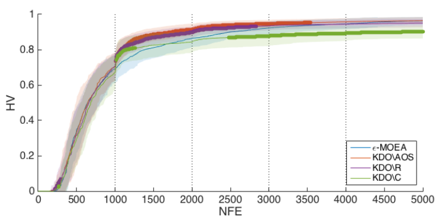A previous project showed that we can effectively incorporate existing expert knowledge into optimization using hyper-heuristics, a technique based on reinforcement learning. While the machine learning layer learns which operators work best for a given problem at hand, there is still a reliance on the quality of the expert knowledge available.
This follow-on project looked at learning new operators on-line, and adding them to the pool of operators to further reduce the number of function evaluations needed to achieve a given performance criterion. Thus, we can not only improve the optimization, but also extract new insights in a human-understable form (logical conjunction and disjunction of a handful of features).
Results of our computational experiments revealed that this is indeed possible. As shown in the figure below, our approach performs better than not using the newly extracted knowledge, or using it in other forms (as constraints, or using random operator selection).

Publications:
[1] N. Hitomi, H. Bang, and D. Selva, “Adaptive Knowledge-Driven Optimization for Architecting a Distributed Satellite System,” J. Aerosp. Inf. Syst., vol. 15, no. 8, pp. 485–500, Jun. 2018.
[2] N. Hitomi, H. Bang, and D. Selva, “Extracting and Applying Knowledge with Adaptive Knowledge-driven Optimization to Architect and Earth Observing Satellite System,” in AIAA Infotech@Aerospace Conference, 2017.
[3] N. Hitomi, H. Bang, and D. Selva, “Extracting and applying knowledge with adaptive knowledge-driven optimization to architect an earth observing satellite system,” in AIAA Information Systems-AIAA Infotech at Aerospace, 2017, 2017.